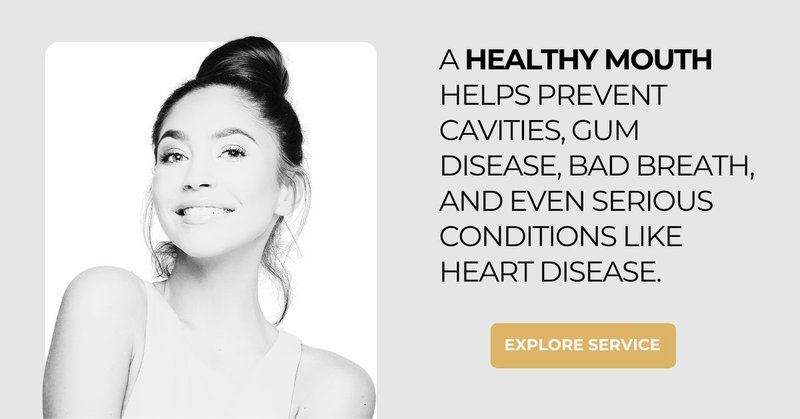The importance of oral hygiene is often underestimated. If you skip brushing or forget cleanings, you risk more than bad breath. Poor oral hygiene can lead to gum disease, tooth pain, and even heart problems. A healthy mouth protects your body and improves your smile. You want to feel good and look confident, right? Then oral care isn’t optional—it’s crucial. Here’s how oral hygiene influences your overall health and why it matters more than you might think.
Key Takeaways:
- Poor oral hygiene is linked to heart disease, stroke, diabetes, pneumonia, endocarditis, and pregnancy complications.
- Gum disease raises cardiovascular risk by causing inflammation and letting bacteria enter the bloodstream.
- There’s a two-way link between diabetes and gum disease: each worsens the other.
- Symptoms of poor dental health include bleeding gums, bad breath, loose teeth, and pain.
- Effective habits: brush twice daily, floss once daily, replace brushes every 3–4 months, and visit the dentist every 6 months.
- Fluoride strengthens enamel; antibacterial mouthwashes help reduce plaque.
- Sugar feeds bacteria that cause cavities; tobacco and alcohol raise risks of gum disease and oral cancer.
- Oral health affects self-esteem, speech, and job success.
- Tongue scraping and fluoride are proven aids; oil pulling offers limited benefit.
- Community programs (e.g., school education, mobile clinics) improve access and outcomes.

The Importance of Oral Hygiene for Your Health and Well-Being
At Smile Dailey Dental, we firmly believe that a healthy smile creates a healthier life. Indeed, the importance of oral hygiene extends well beyond just clean teeth. Not only does it support your confidence and comfort, but it also enhances your entire body’s wellness. Moreover, from preventing disease to improving your mood, taking care of your mouth is one of the easiest ways to protect your health.
Oral Hygiene Influences Your Entire Body
When your mouth isn’t clean, bacteria build up. This can eventually cause gum disease, leading to swelling and bleeding. As the gums become inflamed, tiny openings allow germs to enter your bloodstream. Consequently, these germs can travel to organs like the heart or brain.
Therefore, that’s how poor oral hygiene is linked to:
- Heart disease
- Stroke
- Diabetes
- Pneumonia
- Endocarditis
- Pregnancy complications
Furthermore, a serious gum infection called periodontitis damages the tissues and bones that support your teeth. From there, inflammation spreads through your body, thereby increasing your risk for chronic illnesses. This is why oral and overall health are deeply connected, and why the importance of oral hygiene goes beyond white teeth.
Gum Disease Raises Cardiovascular Risks
Your gums are filled with blood vessels. When they’re infected, they consequently release harmful substances into your bloodstream. As a result, these can:
- Damage heart vessels
- Increase inflammation
- Cause bacteria to stick to weakened heart valves
This condition, known as endocarditis, is life-threatening. Furthermore, studies show that people with severe gum disease are much more likely to experience heart attacks. Therefore, this connection is not just a concern—it’s a red flag.
Diabetes and Oral Hygiene Are Closely Linked
There is a two-way relationship between oral health and diabetes. Firstly, people with diabetes are more likely to get gum disease. Conversely, gum disease makes it harder to control blood sugar. As a result, this escalates the importance of oral hygiene, for some, to life-dependent.
Infections in the mouth create stress and inflammation, which interfere with insulin. Meanwhile, high blood sugar feeds the bacteria in your mouth, making gum problems worse. This cycle can be dangerous unless both conditions are managed together.
The Mayo Clinic and WHO also provide excellent information.
Poor Oral Hygiene Has Serious Consequences
Common signs of poor hygiene include:
- Red or swollen gums
- Bleeding while brushing
- Tooth pain or sensitivity
- Bad breath
- Loose or shifting teeth
These symptoms often indicate gingivitis, the earliest stage of gum disease. If left untreated, it subsequently becomes periodontitis—a deeper infection that destroys bone and causes tooth loss.
Furthermore, tooth decay begins when bacteria feed on sugar and produce acid. This acid, in turn, erodes enamel and causes cavities. Without timely treatment, the decay deepens, eventually leading to pain, infection, or extractions.
Gum infections also allow bacteria to enter the blood. This can lead to systemic infections like pneumonia, endocarditis, or complications during pregnancy.
The Importance of Oral Hygiene with Medications: Dry Mouth Increases Risk
Many medications can cause dry mouth by reducing saliva. Because saliva helps clean your mouth and control bacteria, not having enough can significantly increase the risk of decay and infection.
If you take antihistamines, antidepressants, or blood pressure meds, then you may need extra hydration or special rinses to stay protected.
Warning signs that need attention
Therefore, don’t ignore these red flags:
- Bleeding gums
- Persistent bad breath
- Sores that don’t heal
- Pain when chewing
- Jaw swelling
- Loose teeth
These are signs of deeper problems that could affect your entire body.
Explore this helpful ADA resource on gum health or learn more from Smile Dailey Dental’s service pages.
Daily Habits That Protect Your Health
Brush twice a day for two minutes each time. Use fluoride toothpaste and a soft-bristled toothbrush. Angle the brush at your gumline and clean all sides of every tooth. Don’t forget your tongue—it holds bacteria, too.
Floss once daily, preferably before bed. Use 18 inches of floss, wrap it around both middle fingers, and gently slide it between each tooth in a “C” shape.
The Importance of Products That Support Good Oral Hygiene
- Fluoride toothpaste: Firstly, it strengthens enamel.
- Soft-bristled toothbrush: Additionally, it’s gentle on gums.
- Floss or interdental brushes: Moreover, they clean between teeth.
- Alcohol-free mouthwash: Furthermore, it reduces bacteria without drying your mouth.
- Disclosing tablets: Finally, they show where plaque remains.
In summary, look for the ADA Seal of Acceptance to ensure your products are safe and effective.
When to Replace a Toothbrush or Visit a Dentist
Replace your toothbrush every 3 to 4 months, or sooner if the bristles fray. After a cold or virus, replace it right away.
Visit your dentist every six months for cleanings and exams. If you have gum problems, ask if you should come more often.
These habits may seem simple, but they help prevent serious health problems. Learn more from the National Institute of Dental and Craniofacial Research.
Oral Hygiene Helps Prevent Other Diseases
Gum infections provide a direct path for bacteria to enter your bloodstream. This can trigger:
- Endocarditis (heart infection)
- Clogged arteries
- Lung infections
- Pregnancy complications
During pregnancy, hormones make gums more sensitive. That’s why dentists often recommend more frequent cleanings for expectant parents; the importance of oral hygiene goes bone-deep.
For people with low immunity, such as those with HIV or cancer, the importance of oral hygiene and gum health becomes critical. More information is available in NIDCR’s oral health and HIV/AIDS guide.
The Benefits of Brushing, Flossing, and Rinsing
Flossing is essential—brushing only cleans the surfaces of your teeth, not the spaces between them.
Plaque builds quickly and hardens into tartar, which causes bleeding and gum disease. Flossing each night removes hidden debris and protects your gums.
Mouthwash with antibacterial ingredients like chlorhexidine or cetylpyridinium chloride helps kill leftover bacteria. Choose alcohol-free formulas for dry mouths.
The ADA recommends flossing first, then brushing. This allows the fluoride from toothpaste to reach deeper areas.
The Importance of Oral Hygiene Across the Life Span
Children Need Support and Encouragement
Start brushing your child’s teeth when the first tooth appears. Use a toddler-sized brush and a small dab of fluoride toothpaste.
Make brushing fun with songs, timers, and reward charts. Visit a dentist by age one or six months after the first tooth. Build good habits early, and they’ll last a lifetime.
More tips are available at NIDCR’s oral hygiene page.
Seniors Face Unique Challenges
Older adults often face:
- Dry mouth from medications
- Gum recession and root decay
- Difficulty brushing due to arthritis
- Poorly fitting dentures
Caregivers can help by using larger-handled brushes or electric options. Dentures should be cleaned daily and removed at night. Even patients without teeth need gum care.
Read NIDCR’s guide for caregivers.
The Importance of Diet and Lifestyle for Your Oral Health
Some foods help fight decay, while others make it worse.
Best Foods for Oral Health
- Cheese and milk: Provide calcium
- Leafy greens: Strengthen gums
- Carrots and apples: Clean teeth naturally
- Fatty fish: Help calcium absorption
Worst Offenders
- Sugar: Feeds bacteria that produce enamel-damaging acid
- Soda and candy: Increase cavity risk
- Tobacco: Causes gum disease and cancer
- Alcohol: Dries your mouth, raising decay risk
The CDC’s tobacco quit guide offers support if you need it.
The Social and Emotional Impact of Oral Health
Dental problems don’t just hurt physically—they hurt emotionally.
Clean teeth help you smile confidently. But stained or missing teeth may lead to shame or fear of speaking.
A Forbes study showed that 28% of young adults believe their teeth hurt their job chances. Oral hygiene affects more than health—it affects careers and confidence.
Children with toothaches may miss school. Adults may avoid dates or job interviews due to bad breath or visible decay.
Advanced and Alternative Oral Care Methods
Tongue Scraping
Removes bacteria from the tongue, improving breath and freshness. Use a scraper or your toothbrush, moving front to back. This is a fundamental part of oral hygiene that many people miss the importance of.
Fluoride Treatments
Fluoride strengthens enamel and repairs early damage. Dentists may recommend extra fluoride for high-risk patients.
Explore more advanced oral care options at Smile Dailey Dental.
Communities and Schools Can Support Better Hygiene
How Schools Help
Tooth care lessons, dental visits, and fun activities make oral health part of daily learning. These lessons can last a lifetime.
Community Resources
- Mobile dental clinics
- Free checkups at health fairs
- Fluoridated tap water
Check your water with the CDC’s My Water’s Fluoride tool.
Policy and Planning
State and local governments monitor dental needs, then improve access and education. This leads to healthier families and fewer costly hospital visits.
Ready to Take the Next Step for Your Smile?
Let’s Talk About Your Oral Health
At Smile Dailey Dental, we’re here to help you protect your teeth—and your overall health. Whether you need a checkup or a complete smile makeover, our caring team is ready for you. Don’t wait until problems get worse. Contact us today and take the first step toward a healthier, happier smile!
For more services, visit our homepage or check out our general dentistry services designed to support lifelong oral health.

